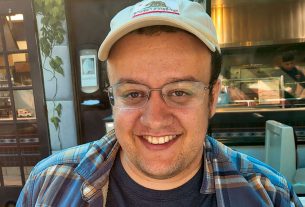On today’s daf, the Talmud is trying to work out what minimum amount of food one has to eat to be found guilty of breaking the Yom Kippur fast. Best, of course, is not to eat or drink anything. But if you accidentally put something into your mouth, are you liable? It depends on how much you accidentally swallow.
Normally, a minimal unit of food, according to the rabbis, is an olive’s bulk — meaning the volume of an olive (a small bite, essentially). In the case of Yom Kippur, however, the sages understand it to be a different measure — the volume of a large date — because the Torah doesn’t use language of “eating” but rather “self-affliction” (as we discussed on Yoma 74). The language shift serves as a subtle clue that a different minimal volume is required for transgression.
The most common measures of food volume in the talmudic era were an olive, an egg, a dried fig or date — and a revi’it, a mouth or cheekful of drink. In modern measurements, an olive, egg and revi’itare considered about 1, 2.5 and 4 fluid ounces, respectively. It should come as no surprise that authorities have argued about these measurements and most notably the Chazon Ish (1878-1953) controversially increased all the measurements by at least a third.
But given that the Torah does not specify these volumes at all, where do they come from? How does the Talmud “know” that accidentally consuming a large date’s bulk of food is the difference between fasting and not fasting? Our Gemaraquotes an early rabbinic teaching that explains:
It was taught: Measures of punishments (such as the amount of food that qualifies someone as no longer self-afflicting on Yom Kippur) are halakhah transmitted to Moses from Sinai.
Others say: These measures were instituted by the court of Yavetz.
The first opinion is that Moses received all the measurements not stated explicitly in the Written Torah on Mount Sinai and passed that information along as part of the Oral Law. But the second opinion says the measures were instituted later, by the court of Yavetz. Haven’t heard of Yavetz? He’s pretty obscure. The name is first mentioned in 1 Chronicles 2:55 where it is a place. But later, in 1 Chronicles 4:9, Yavetzis a person: “Yavetz was more esteemed than his brothers; and his mother named him Yavetz, ‘Because,’ she said, ‘I bore him in pain (otzev).’” So, how come the rabbis think he’s a halakhic expert?
To understand why Yavetz was considered an early halakhic expert, we need to dive into some biblical associations. The place Yavetz is called a place of scribes and known as the home to the Kenites, descendants of Yitro (Moses’ father-in-law who was known as a just and fair judge). This links Yavetzwith Moses and the law. In the Talmud, the character Yavetzis identified with another biblical character, Otniel ben Kenaz, who appears in the Book of Judges (3:9) and who is identified as the brother of Caleb and the conqueror of Kiriat Sefer (literally the City of the Book). The Talmud credits him with deducing all the laws — a total of 1,700 — that were forgotten after Moses died. Otniel is said to have restored them entirely through his logic. (Temurah 16a)
When our daf identified the minimum measure of food that, upon being accidentally consumed, breaks one’s Yom Kippur fast (a large date’s worth), and then asks whether this was a halakhah given to Moses at Sinai and passed down through the generations, or one of the forgotten halakhot that were re-derived by Yavetz (a.k.a. Otniel ben Kenaz) one thing it does not question is that this law, which is found nowhere in the Torah, comes directly from God. In fact, the Talmud is so serious about this idea, that it essentially reiterates it in the next few lines:
And isn’t it written: “These are the mitzvot which the Lord commanded Moses for the children of Israel at Mount Sinai” (Leviticus 27:34)? The word “these” underscores that a prophet is not permitted to introduce anything new from here on. Rather, the people forgot some laws, and the prophets later reestablished them.
On the part of the rabbis, it’s a large claim to authority — that their whole corpus comes directly from God.
Read all of Yoma 80 on Sefaria.
This piece originally appeared in a My Jewish Learning Daf Yomi email newsletter sent on June 30th, 2021. If you are interested in receiving the newsletter, sign up here.
The post Yoma 80 appeared first on My Jewish Learning.




